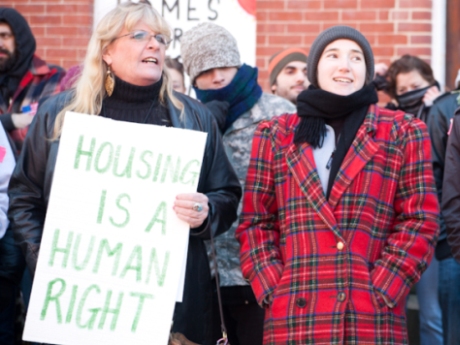Why Human Rights Should Inform How States Spend National Foreclosure Settlement Money

Last April, the federal government and 49 states negotiated a $25 billion settlement for widespread, wrongful foreclosures with the nation’s five largest loan servicers. The National Foreclosure Settlement includes $2.5 billion in direct payments for the states and D.C. to fund activities ranging from foreclosure prevention and restitution to programs addressing community blight. While some states intend to use the money to fill state budget gaps, others are using the funds for programs that demolish housing and ignore those most impacted by the housing crisis. NESRI partner Occupy our Homes in Baltimore is demanding that the funds remedy the displacement and suffering caused by loan servicers and that those most impacted by the crisis help decide how the money is spent.
According to a report by Enterprise Community Partners, only 35 states are using some or all of their settlement funds for housing. These states will spend the money on initiatives like foreclosure prevention, neighborhood stabilization, housing counseling and legal assistance to homeowners. But six states are forgoing any housing-related use and another nine are currently undecided. Additionally, as reported by the New York Times, states are dedicating these funds to everything from general funds to higher education, energy for low-income families, prisons and attracting businesses.
While states must address all the human rights needs of their communities, those whose housing rights were violated must also receive effective and reasonable remedies. When we closely examine state choices, even among states committed to using funds for housing, neither of these essential goals are assured.
In the neighborhood meetings of NESRI partner Occupy Our Homes Baltimore (a human right to housing spin-off from last fall’s Occupy movement), foreclosed-upon homeowners disdain the settlement. Maryland claims it will use its settlement funds on “neighborhood stabilization,” which means spending $20 million to simply destroy vacant housing. Of the $60 million in hard cash that Maryland will receive from the settlement, another $20 million effectively fills the gaps in government, Legal Aid and Housing Counseling budgets—sustaining or providing employment to professionals aiding the victims of the predatory crisis. While these services are important, it is both cruel and irrational to deprive the victims of direct support that would in fact make these services unnecessary. It is no different than refusing to cure a wound but paying for the extra band-aids needed as a result.
One of the most egregious decisions involves Baltimore, where the Housing Authority will use its share of the settlement money to demolish vacant housing although 69,000 people have received foreclosure notices since 2008, over 32,000 people are waiting for low-income housing, and 4,000 persons are homeless on any given night.
The fact that the Authority wants to use $9 million to destroy housing rather than house people is a blatant indication that it serves the private real estate market rather than the poor. Ostensibly, demolitions in blighted neighborhoods will increase property values for all in Baltimore, but it is likely that the profits of a healthier real estate market will go in the pockets of a few—most of whom were not directly victimized by the illegal practices of the settlement.
Occupy Our Homes Baltimore made these points in a June 13 Baltimore Sun op-ed that also showed Occupy’s attempt to use a human rights-based approach to bridge racial and class divides in this crisis. To further its human rights demands, the Baltimore group plans to attend a Maryland Attorney General-hosted litigation settlement workshop on June 26.
How is it possible that such clearly unethical policy decisions are considered acceptable? In large part, because those affected by the crisis are not allowed to participate in the decision making. While Maryland appointed a Mortgage Settlement Funds Workgroup to make recommendations for the use of these funds, none of the members were foreclosed-upon homeowners. Given the fact that the settlement money comes from banks who engaged in illegal practices, it is extraordinary that “representative officials” recommend spending almost two-thirds of Maryland’s settlement money in ways that ultimately serve real estate and banking interests.
Everyone has the human right to self-determination and to take part in the conduct of public affairs, regardless of the economic or social right at stake. As noted by a just-released American Political Science Association Task Force Report, participation and articulating one's interests are “necessary to fulfill civil and political rights and to realize social and economic rights. … Rights are most secure when they are embedded in a web of complementary and mutually reinforcing rights.”
Occupy took to the streets last fall to model the democracy that had been lost to the power of the 1%. This spring, at least one Occupy spin-off in Maryland will confront the AG settlement to lay the groundwork for human rights here at home.
